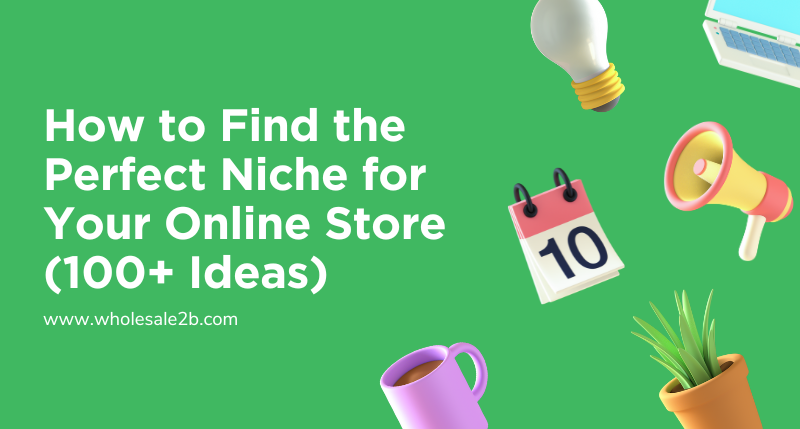
How to Find the Perfect Niche for Your Online Store (100+ Ideas)
Are you thinking of starting an online store but unsure of which niche to choose? Selecting the right niche is crucial for the success of your e-commerce business. It’s not just about following the latest trends or selling popular products. You need to find a niche that aligns with your passion, expertise, and has enough demand to sustain your business.
In this comprehensive guide, we will walk you through the process of finding the perfect niche for your online store. We will share foolproof strategies and valuable tips to help you make an informed decision. Let’s dive in!
1. Follow Your Passion and Expertise
Starting an online store is a long-term commitment. To ensure your success and sustain motivation, it’s essential to choose a niche that you are truly passionate about. Consider your hobbies, interests, and areas where you have expertise. What are you genuinely enthusiastic about? What knowledge or skills do you possess?
When you are passionate about your niche, it becomes easier to connect with your target audience and create engaging content. Your passion will shine through your products and marketing efforts, attracting like-minded customers who resonate with your brand.
2. Conduct Thorough Market Research
Passion alone is not enough; you need to validate your niche through market research. Use keyword research tools like Ubersuggest or SEMrush to identify the search volume and competition for keywords related to your niche. This data will give you insights into the demand and level of competition in your chosen niche.
Additionally, analyze your potential competitors. Look for established players in your niche and assess their market share, product offerings, pricing, and marketing strategies. Identifying gaps or areas for improvement can help you carve out a unique position in the market.
3. Find a Niche with High Demand
Your chosen niche should have a sufficient market size and demand to support your business. Look for niches with a healthy balance of search volume and competition. Avoid niches that are too broad or too narrow. Aim for a niche that has a specific target audience and addresses their pain points or desires.
Consider using tools like Google Trends to track the popularity of your niche over time. Look for consistent or growing demand, as this indicates a stable market. You want to choose a niche that has long-term potential and isn’t just a passing trend.
4. Identify Profitable Sub-Niches
While researching your niche, look for profitable sub-niches within your broader market. These sub-niches can help you target a more specific audience and differentiate your store from the competition. For example, if your niche is “fitness,” you can narrow it down to “yoga accessories” or “home workout equipment.”
By focusing on a sub-niche, you can become an expert in that area and provide specialized products and content tailored to your target audience’s needs. This targeted approach can help you stand out and attract loyal customers.
5. Analyze Your Resources and Assets
Consider your available resources and assets when choosing a niche. Do you have any existing expertise or connections in a particular field? Do you have access to unique products or suppliers? Leveraging your resources and assets can give you a competitive advantage and make it easier to enter and excel in a specific niche.
For example, if you have a background in fashion design, starting an online store that sells custom-made clothing or accessories can capitalize on your skills and knowledge. Building on your existing strengths can save you time and money in the long run.
6. Consider High-Dollar Products
While many e-commerce entrepreneurs start with low-priced items, consider targeting high-dollar products. Selling higher-priced products can lead to higher profit margins and fewer customer service demands. Instead of selling a large volume of low-priced items, you can focus on selling a few high-ticket products to reach your revenue goals.
However, keep in mind that selling high-dollar products often requires more customer education and a higher level of trust. You’ll need to invest in building a compelling brand and providing exceptional customer service to justify the higher price points.
7. Solve a Problem
Look for niches that solve specific problems or address pain points for your target audience. Identify common frustrations or challenges that your potential customers face and find ways to provide solutions through your products and services.
For example, if you notice that pet owners struggle with finding affordable and eco-friendly pet supplies, you could create an online store that specializes in sustainable pet products. By addressing a specific problem, you can attract customers who are actively seeking a solution and position your store as a trusted resource.
8. Explore Untapped Markets
While it’s important to consider market demand, don’t be afraid to explore untapped or emerging markets. Look for niche markets that haven’t been saturated with competition yet. These markets may offer unique opportunities for growth and innovation.
Keep an eye on emerging trends and technologies that could disrupt existing markets or create new ones. By being an early adopter or innovator in these untapped markets, you can establish yourself as a leader and gain a competitive edge.
9. Stay Updated on Industry Trends
To stay relevant and ahead of the competition, it’s crucial to stay updated on industry trends and consumer preferences. Subscribe to industry newsletters, follow relevant blogs and social media accounts, and attend trade shows or conferences.
By staying informed, you can identify new opportunities, anticipate changing customer needs, and adapt your business strategy accordingly. Continuously evolving and offering fresh and relevant products will help you maintain a competitive edge in your niche.
10. Test and Refine Your Niche
Once you have identified a potential niche, it’s time to test and validate your ideas. Create a minimum viable product or conduct a market survey to gather feedback from your target audience. Use this feedback to refine your niche, products, and marketing strategies.
Testing your niche allows you to gather real-world data and make informed decisions based on customer feedback. Be open to making adjustments and pivoting if necessary. The key is to continuously learn and adapt based on customer preferences and market dynamics.
Now that you have a solid understanding of how to find the perfect niche for your online store, it’s time to take action. Remember, choosing the right niche is a critical step towards building a successful and profitable e-commerce business. Combine your passion, market research, and strategic thinking to identify a niche that resonates with your target audience and sets you up for long-term success.
Bonus: Here is a list of 100 niche market ideas to inspire you:
- Sustainable fashion
- Organic skincare products
- Fitness equipment for home workouts
- Custom pet accessories
- Vegan and gluten-free snacks
- Handmade jewelry
- Eco-friendly home decor
- Outdoor gear for camping and hiking
- Personalized gifts
- Specialty coffee and tea
- Vintage clothing and accessories
- Natural and organic baby products
- DIY craft kits
- Subscription boxes for specific hobbies or interests
- Tech gadgets for smart homes
- Unique phone cases and accessories
- Art supplies for artists
- Travel accessories for frequent travelers
- Educational toys and games for children
- Home gardening supplies
- Customized stationery and planners
- Niche fitness apparel (e.g., plus-size activewear, yoga clothing for men)
- Handmade soaps and candles
- Specialty spices and seasonings
- Eco-friendly cleaning products
- Personalized home goods (e.g., monogrammed towels, custom wall art)
- Handmade leather goods
- Vintage vinyl records and music memorabilia
- Specialty pet foods and treats
- Natural and organic pet care products
- Custom wedding and event invitations
- Health and wellness subscription boxes
- Natural and organic cleaning products
- Custom furniture and home decor
- Artisanal chocolate and gourmet sweets
- Specialty wines and craft beers
- Niche fitness equipment (e.g., barre workout supplies, pilates accessories)
- Personalized children’s books
- Handmade pottery and ceramics
- Specialty kitchen gadgets and utensils
- Customized clothing and accessories for specific sports or activities
- Natural and organic beauty products for men
- Niche home workout programs (e.g., prenatal fitness, senior fitness)
- Handmade wooden toys and games
- Custom wedding favors and decorations
- Specialty tea blends and herbal infusions
- Personalized photo albums and scrapbooking supplies
- Eco-friendly baby products (e.g., cloth diapers, organic baby clothing)
- Handmade bath and body products
- Unique home office supplies and organization tools
- Niche equestrian supplies (e.g., horse grooming products, riding apparel)
- Custom-made wedding dresses and bridal accessories
- Specialty pet grooming products
- Natural and organic supplements and vitamins
- Handmade baby blankets and accessories
- Niche outdoor clothing and gear (e.g., fishing apparel, rock climbing equipment)
- Custom car accessories and decals
- Eco-friendly menstrual products
- Personalized pet portraits and artwork
- Specialty hot sauces and condiments
- Custom-made shoes and footwear
- Niche musical instruments and accessories
- Natural and organic household products
- Handmade quilts and blankets
- Specialty baking supplies and ingredients
- Custom bicycle accessories and components
- Niche swimwear and beach accessories
- Personalized home brewing kits
- Eco-friendly fashion accessories (e.g., bamboo sunglasses, upcycled jewelry)
- Handmade pet beds and furniture
- Specialty fitness trackers and smartwatches
- Custom-made engagement and wedding rings
- Natural and organic pet grooming products
- Niche board games and puzzles
- Personalized home fragrance products
- Specialty running shoes and athletic footwear
- Handmade pet toys and accessories
- Customized motorcycle gear and accessories
- Eco-friendly baby clothing and accessories
- Niche cycling apparel and accessories
- Personalized luggage tags and travel accessories
- Specialty health foods and supplements (e.g., vegan protein powders, gluten-free snacks)
- Custom-made outdoor furniture and decor
- Natural and organic pet supplements
- Handmade greeting cards and stationery
- Specialty fishing gear and tackle
- Personalized jewelry for couples and families
- Niche home brewing supplies and ingredients
- Eco-friendly party supplies and decorations
- Handmade baby shower gifts and accessories
- Custom-made backpacks and bags
- Specialty photography equipment and accessories
- Natural and organic hair care products
- Niche gardening tools and equipment
- Personalized pet memorial products
- Specialty golf equipment and accessories
- Handmade pet clothing and costumes
- Customized home security systems and devices
- Eco-friendly fashion for children
- Niche car detailing products and supplies
Take Your Time To Review Our Products & Suppliers
REGISTER FOR FREENo Credit Card Needed








